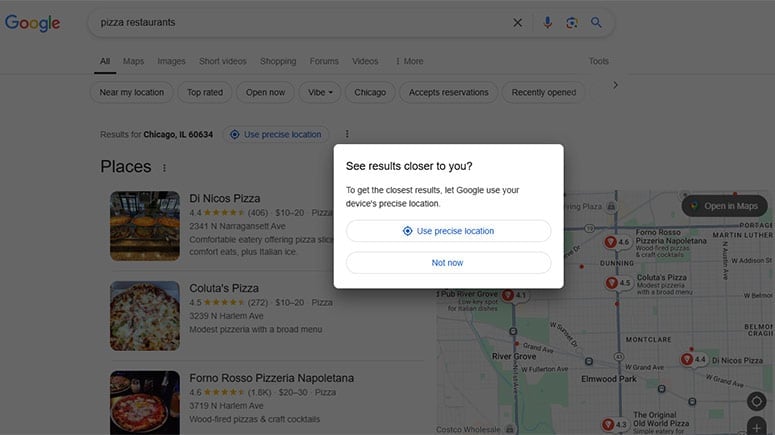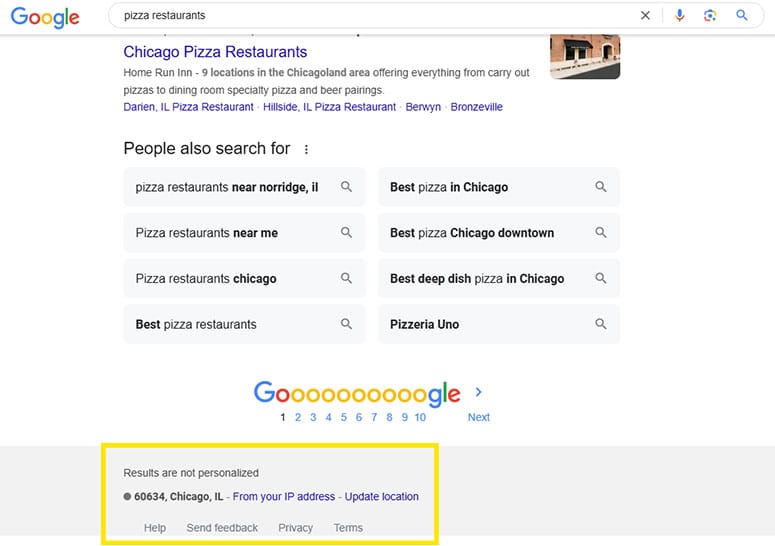Years ago, “near me” was a local search engine optimization (SEO) cheat code. Not anymore. Today, you need to demonstrate that you’re truly local to rank locally.
Back when search engines needed help understanding location, adding phrases like “near me” to your metadata and content could give you a boost. But search has evolved, and so should your strategy. Today, relying on outdated tactics like loading your content with phrases like “plumber near me” or “best pizza near me” likely won’t deliver the results you expect. It’s time to leave it behind and focus on what actually moves the needle in local search.
Search Has Grown Smarter
Thanks to advancements in search engine technology, Google no longer relies on keywords like “near me” and “near you” to understand user intent or location. Instead, Google search detects where you are through a variety of methods and serves locally relevant results automatically. Your location as a searcher is often known — whether you type it or not.
Google uses a variety of signals to determine a searcher’s proximity to local businesses, including:
- Browser and App Permissions: If you’ve ever allowed a website or app to access your location in the Chrome browser, that information helps pinpoint your area, especially on mobile.
- Google Account Activity: Frequent location-based searches (grocery stores, gyms, restaurants, etc.) and travel patterns can reveal where you live, work, or visit often.
- GPS Data (Mobile Devices): Smartphones can provide highly accurate location data through built-in GPS, especially when location services are enabled.
- IP Address: On desktops or Wi-Fi-connected devices, your IP address gives Google a general sense of your city or region.
- Wi-Fi or Bluetooth Networks: Devices can use nearby Wi-Fi hotspots or Bluetooth beacons to triangulate your position even without GPS.
So when a user searches “pizza restaurants” while sitting in a downtown hotel, they’re shown pizza places near them, even though they never typed the phrase. If you have your location off while you search, you may be prompted to turn it on:

And even if you choose not to enable your precise location, Google will still estimate your general area using your IP address. You can see this at the bottom of the search engine results page (SERP), where it clearly states the location being used — often down to the ZIP code — even when results aren’t personalized:

You might also notice in the image above that in the People also search for section, “Pizza restaurants near me” appears as a suggested query. This is because the phrase is still frequently searched. However, there’s a key difference between Google showing it on the SERP and you using it in your content. Commenting on Bluesky, Google’s John Mueller has clarified that optimizing for “near me” is unlikely to help in modern SEO, stating succinctly that it’s not a viable SEO strategy in the way many still assume.
Are People Still Searching “Near Me”?
Yes, they are. According to recent data from Think with Google, worldwide searches on Google Maps for terms like “shopping near me” have increased by more than 100% year-over-year. It’s also valuable regarding search traffic: 76% of consumers who use “near me” terms visit a business within a day.
Tools like Google Keyword Planner may show high search volumes for keywords containing “near me,” “near you,” “close to me,” “closest to me,” and similar phrases, but that doesn’t mean you need to chase them with on-page optimization. You may rank for them, but results for these queries are already handled by location-aware algorithms that don’t rely solely on keyword matching.
Why “Near Me” Optimization Falls Flat
If you’re still adding “near me” to title tags, meta descriptions, headers, and URLs, or stuffing it into your copy, here’s why that effort may be misplaced:
It’s Algorithmically Ignored and Redundant
Google doesn’t rank pages just because they include “near me.” It treats that phrase as a signal to use the searcher’s proximity, not a signal to consider keywords on your site. Since the context of the location is already understood by Google and by visitors to your site, including it in your copy is repetitious and delivers a lackluster user experience.
It Lacks Specificity
“Near me” is vague. Phrases like “Tampa wedding florist” or “emergency HVAC repair in Denver” are more helpful for both users and search engines. Even adding the city isn’t necessary in many searches, particularly mobile-based, though many searchers still do.
It Looks Spammy
Repeating these terms in content can come off as keyword-stuffed or unnatural, especially when overused in body text or headings. This may turn off users and send poor-quality signals to search engines.
What You Should Be Doing Instead
If “near me” is off the table, what does help your business show up in local searches? Search continues to evolve, but here are a few smarter, more sustainable strategies that reflect how search works today:
Be Mobile-First
Local searches often happen on smartphones. Concentrate on improving Core Web Vitals, ensuring your site is fast, mobile-friendly, and easy to navigate, especially your contact info and calls-to-action, which should be easily accessible on small screens. Always remember that Googlebot crawls as a mobile user agent, so your mobile presence is critical to your SEO success.
Create Local Landing Pages
Build city- or neighborhood-specific pages with original, helpful content, not boilerplate templates. Include the name, address, and phone number (NAP), directions, local landmarks, local management staff, testimonials from local customers, services offered, and more truly local content to differentiate each location page.
Earn Local Backlinks and Mentions
If it is logical for your business, partner with local events, charities, or organizations. Get listed on local directories and engage with the community to earn credible backlinks to aid your E-E-A-T.
Leverage Context Clues
Mention relevant local terms within your content. Use parks, intersections, communities, or anything familiar to your target audience.
Optimize Your Google Business Profile
Make sure NAP is accurate and consistent across your website, Google Business Profile, and local directories. Complete every section and keep it updated. Encourage customer reviews and respond to them to build trust and visibility.
Focus on Signals, Not Slogans
Just because “near me” and related terms still appear in searches doesn’t mean you must use them explicitly. No, you don’t need to tell Google you’re nearby. You just need to show that you are the best local choice by demonstrating that you are local rather than just saying you’re local. Do that well, and Google will connect the dots. Instead of chasing outdated keywords, focus on what really matters: accurate location signals, user intent, and high-quality content that reflects your business and community.




